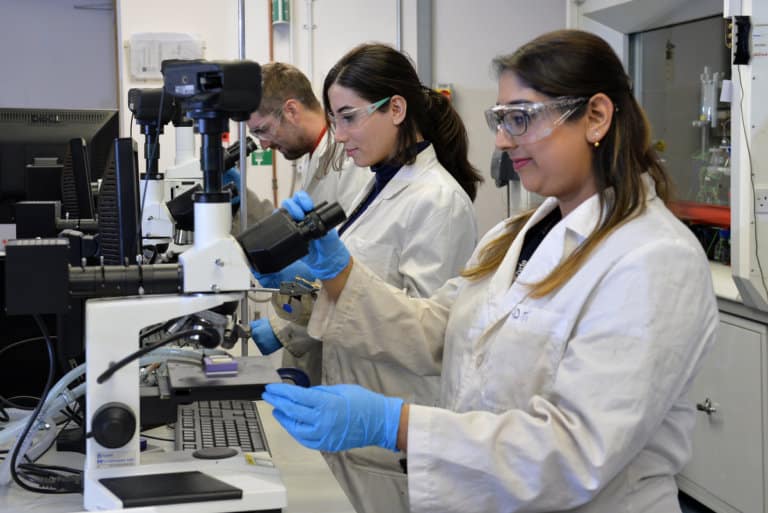
In recent decades, the UK has witnessed a remarkable transformation in its higher education landscape, one that is fostering a groundbreaking wave of female talent within the realm of healthcare innovation. Breaking free from traditional gender barriers, UK universities have taken proactive measures to empower and encourage women to pursue careers in science, technology, engineering, and mathematics (STEM) fields, particularly in the crucial domain of healthcare.
Still, we have a long way to go. Only 35% of STEM students in higher education in the UK are women. The Pew Research Centre states that “women make up a large majority of all workers in health-related jobs, but remain underrepresented in other job clusters, such as the physical sciences, computing and engineering.”
The best UK universities plan to change this. With a resolute commitment to diversity and inclusion, some institutions have paved the way for a new generation of female healthcare innovators who are challenging norms, reshaping research frontiers, and revolutionising medical practices. Here are four of the top schools nurturing a new generation of female healthcare innovators:
University of Strathclyde
University of Strathclyde’s Biomedical Engineering department, founded in 1962, is one of the oldest in the world. Since then, the department has continued to enhance the experience of students, with new laboratories focussed on further enhancing its world-leading research can be seen. In 2021, it invested 15.5 million pounds to upgrade all training and research facilities to be state-of-the-art so students can work on more breakthrough technologies. And in the Complete University Guide 2024 for Medical Technology and Biomedical Engineering, the department is ranked third in the UK for its undergraduate degree.
Programmes here prepare students to work towards a common goal of “engineering the future of healthcare.” By working with patients requiring rehabilitation devices and technologies, students get invaluable insight into their professional futures. Such hands-on experiences are plenty, thanks to the university’s links with industry and health sectors to address major health challenges.
The MSc/PgDip/PgCert Prosthetics &/or Orthotics Rehabilitation Studies is specially designed for professionals who want to learn at their own pace and upgrade their existing qualifications. International students can remain in their home country and work full-time as well. The MSc Prosthetics & Orthotics is unique as this full-time programme brings together the knowledge of the engineering and medical sciences with advances in technology and practice.
An added bonus is that the department hosts the only international Society for Prosthetics and Orthotics (ISPO) category 1 undergraduate programme in the UK. Many staff have delivered prosthetic and orthotic education in low or middle-income countries (such as Sri Lanka, Vietnam, Laos, Cambodia, India, Tanzania, and Rwanda) and are advisers and external examiners on their developing undergraduate and postgraduate programmes. This way, they have a deep understanding of the local hurdles for students and healthcare practitioners.
Whether on or off campus, students are supported. Online students have a bespoke virtual learning environment (MyPlace), plus free resources and activities to enhance their learning and language skills. Disability and Wellbeing Services advisers support students with any disability, mental health and wellbeing related needs.

Swansea University’s Faculty of Science and Engineering has a thriving research community. Source: Swansea University
Swansea University
In terms of student satisfaction, Swansea University is in the top 20 best UK universities (StudentCrowd University Awards 2022) and ranked 26th in the UK (Guardian University Guide 2023). It has made great strides in challenging gender bias. For instance, the senior leadership team features five female senior leaders and five male leaders while the student population is made up of 48% females.
Its Faculty of Science and Engineering is nationally and globally recognised, championing innovative and inclusive learning environments. With the necessary accreditations, Engineering at Swansea features nine disciplines: aerospace, biomedical, chemical, civil, electronic and electrical, general engineering, materials science and mechanical engineering. Whilst Science at Swansea offers programmes in biosciences, chemistry, computer science, geography, mathematics, physics and sport and exercise science.
Leading them is a full roster of women researchers. They lead research into using waste carbon dioxide to help grow algae to clean up waste fumes from local industry, sustainable manufacturing and recycling of batteries, quantifying animal movement to understand how animals respond to our changing world, and more. Amongst them, there’s no shortage of inspiration to transform Swansea students into future leaders and champions of industry, each equipped to meet the challenges and opportunities for a career in research and beyond.

Queen’s University Belfast is one of the oldest in the UK. Source: Queen’s University Belfast
Queen’s University Belfast
Queen’s University Belfast’s School of Medicine, Dentistry and Biomedical Sciences is home to world-class teaching resources and internationally recognised research infrastructure. Established in 1849 and one of the oldest in the UK, this school’s faculty has grown from five members to over 560. It has over 2000 students out of a university with more than 21,000 students.
The school’s three research centres — The Patrick G Johnston Centre for Cancer Research, Wellcome-Wolfson Institute for Experimental Medicine and Centre for Public Health — have been adept at churning out companies and partnerships to change the future of medical/biomedical research across the world.
The first area within Queen’s University to set up its own office dedicated to gender equality, the School of Medicine, Dentistry & Biomedical Sciences has been noticed for its efforts. “The School of Medicine, Dentistry and Biomedical Sciences has been awarded an Athena SWAN Gold Award, making it the second medical school in the UK and the only school offering courses in Dentistry and Biomedical Sciences to hold such an award,” says Professor Michelle McKinley and Professor Karen McCloskey. “Queen’s University continues to demonstrate its leadership in gender equality with this new Gold award for SMDBS.”

Imperial College London researchers have made many fascinating discoveries that have had a huge impact. Source: Imperial College London
Imperial College London
As global pioneers in their field, Imperial College London’s Department of Bioengineering began in the 1960s with research that shaped the emergence of the discipline. What started as two groups merged into one: the Centre for Biological and Medical Systems, in 1989. It has since been the home to groundbreaking innovations, with researchers that are described as detailed, interdisciplinary, leading, guiding, and fun.
Bioengineering students have access to all the best. The department has more than 5,000 square-metre of secure scientific and engineering accommodation organised into a number of well-equipped, multi-user laboratories, workshops and makerspaces. All of this is located in the Bessemer and Royal School of Mines Buildings in South Kensington and the Sir Michael Uren Hub in White City. With the help of these facilities and experienced faculty, the department now boasts 20 spin-out companies and attracts seed and philanthropic funding.
Research at Imperial College London is just as impressive. This is the home of many fascinating discoveries, placing the university top in the UK overall for research, with a greater proportion of world-leading research than any other UK university. For example, researchers here have improved cancer treatments by developing a bipolar electrode system that employs RF current to coagulate a track in the liver; the track can then be cut without bleeding.
*Some of the institutions featured in this article are commercial partners of Study International










